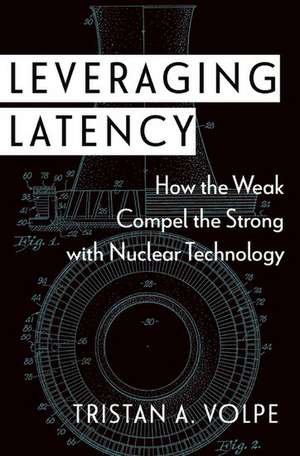Leveraging Latency: How the Weak Compel the Strong with Nuclear Technology: Disruptive Technology and International Security
Autor Tristan A. Volpeen Limba Engleză Hardback – 31 mar 2023
Preț: 166.19 lei
Preț vechi: 190.01 lei
-13% Nou
Puncte Express: 249
Preț estimativ în valută:
31.80€ • 33.08$ • 26.26£
31.80€ • 33.08$ • 26.26£
Carte disponibilă
Livrare economică 14-20 martie
Livrare express 08-14 martie pentru 53.67 lei
Preluare comenzi: 021 569.72.76
Specificații
ISBN-13: 9780197669532
ISBN-10: 0197669530
Pagini: 264
Dimensiuni: 236 x 165 x 24 mm
Greutate: 0.52 kg
Editura: Oxford University Press
Colecția OUP USA
Seria Disruptive Technology and International Security
Locul publicării:New York, United States
ISBN-10: 0197669530
Pagini: 264
Dimensiuni: 236 x 165 x 24 mm
Greutate: 0.52 kg
Editura: Oxford University Press
Colecția OUP USA
Seria Disruptive Technology and International Security
Locul publicării:New York, United States
Recenzii
This creative and well-researched book convincingly shows that relatively weak states can coerce stronger superpowers by threatening to build nuclear weapons. It teaches us that having the mere capacity to make nuclear weapons—known as 'nuclear latency'—can shape international relations. Volpe's book is essential reading for anyone interested in nuclear proliferation, coercion, or crisis bargaining.
Tristan Volpe has written a fascinating book exploring how states use the potential to acquire nuclear weapons, known as nuclear latency, to gain influence in international politics. He theorizes the existence of a Goldilocks Zone where states with just enough nuclear latency can both issue threats and make assurances, and tests his theory across a wide range of case studies, from Japan to Iran. The in-depth cases are interesting, well-written, and strongly support his argument. I highly recommend this to those interested in international politics, and especially in issues surrounding nuclear proliferation and nuclear weapons.
Leveraging Latency reminds us that even hypothetical military capabilities can be used as bargaining power. But as Volpe elegantly explains, countries must perform a delicate balancing act to extract real concessions from military potential. His rich case studies illuminate the strategic logic of nuclear latency, revealing the hidden dilemmas and tradeoffs of bargaining over nuclear programs. Students of coercive diplomacy and nuclear proliferation will find this book indispensable.
Tristan Volpe has written a fascinating book exploring how states use the potential to acquire nuclear weapons, known as nuclear latency, to gain influence in international politics. He theorizes the existence of a Goldilocks Zone where states with just enough nuclear latency can both issue threats and make assurances, and tests his theory across a wide range of case studies, from Japan to Iran. The in-depth cases are interesting, well-written, and strongly support his argument. I highly recommend this to those interested in international politics, and especially in issues surrounding nuclear proliferation and nuclear weapons.
Leveraging Latency reminds us that even hypothetical military capabilities can be used as bargaining power. But as Volpe elegantly explains, countries must perform a delicate balancing act to extract real concessions from military potential. His rich case studies illuminate the strategic logic of nuclear latency, revealing the hidden dilemmas and tradeoffs of bargaining over nuclear programs. Students of coercive diplomacy and nuclear proliferation will find this book indispensable.
Notă biografică
Tristan A. Volpe is Assistant Professor in the Defense Analysis Department of the Naval Postgraduate School. He is also a Nonresident Fellow in the Nuclear Policy Program at the Carnegie Endowment for International Peace.


